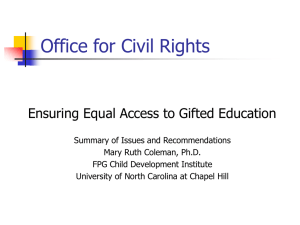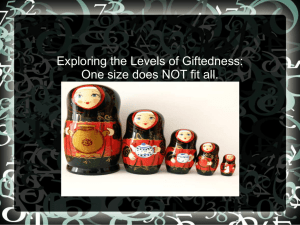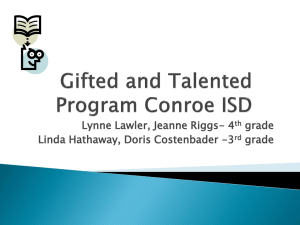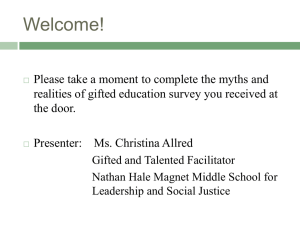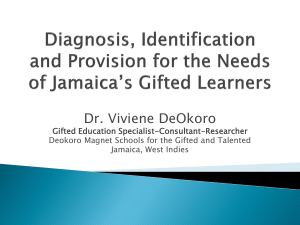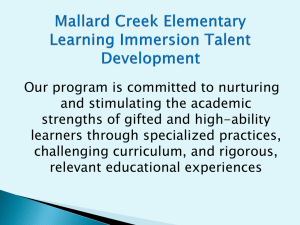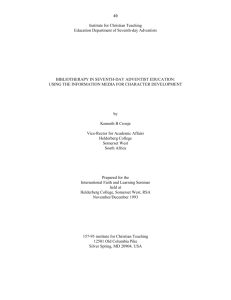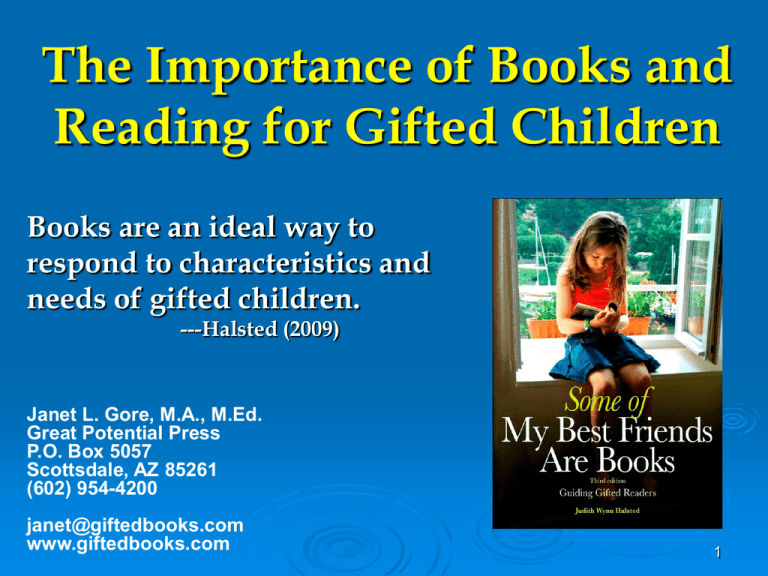
The Importance of Books and
Reading for Gifted Children
Books are an ideal way to
respond to characteristics and
needs of gifted children.
---Halsted (2009)
Janet L. Gore, M.A., M.Ed.
Great Potential Press
P.O. Box 5057
Scottsdale, AZ 85261
(602) 954-4200
janet@giftedbooks.com
www.giftedbooks.com
1
Characteristics of Gifted Children
Complex
sentence structures
Unusually large vocabularies
Greater comprehension of language
Longer attention span, persistence
Intensity of feelings and actions
Wide range of interests
Strong curiosity; limitless questions
Like to experiment; put ideas or things
together in unusual ways
2
Their Intellectual Needs
AS
Social and Emotional Needs
Gifted
children who are not challenged are
not happy and do not feel fulfilled.
3
Their Intellectual Needs
ARE
Some of Their
Social and Emotional Needs
It
is important that parents and teachers
see that intellectual development is a
requirement for these children and not
merely a phase.
4
Social and Emotional Needs
They
enjoy “work”
Work is important to them
They need and enjoy challenge
They have a drive to understand
They are often more introverted than
others
They are often non-conforming
They need and appreciate alone time
5
Social-Emotional Differences
They
live with ambivalence (highs, lows)
They recognize early that they are
different
They have high sensitivity, intensity
They are unusually aware of moral
issues…
They strive for perfection
6
Some Special Needs of Gifted
Relationships
with others
Recognizing differences
Taking risks
Accepting dissonance between
expectations vs. performance
Coping with impatience
Forming identity
Time
alone
Buescher (1985)
7
How Books Help Them Cope
Others have felt different and alone
Others have taken risks…
Others have been afraid…
Others are sensitive…
Others are searching for identity …
I am not the only one, then.
Phew!
8
GIFTED CHILDREN AND
CHALLENGING BOOKS GO
TOGETHER!
9
Selecting Books
Books
should be challenging to gifted
readers. They should stretch vocabulary,
have complex, unresolved plots and
contain challenging literary elements like
metaphor, flashbacks, etc.
Characters should be experiencing some
of the same issues as the child: making
friends, establishing identity, dealing with
intensity, perfectionism, etc.
10
Look for Books with These
Themes:
Aloneness
Perfectionism
Identity
Arrogance
Friendships
Achievement
Moral
Resilience
concerns
Introversion
Intensity
Creativity
Sensitivity
Drive
to
Understand
11
Books Can Help Gifted
Children Establish an
Identity
12
How Books Can Help
Characters in the book may be dealing
with some of the same issues as the child
(Making friends, establishing an identity,
feeling alone or different, intensity,
perfectionism, making decisions)
13
When We
Discuss a Book…
Individual or group discussion can
lead to fresh insights that will
help the child cope with situations
in his or her own life.
(Halsted, 2009, p. 104)
14
Bibliotherapy
A
process of dynamic interaction
between the personality of the reader
and literature…
15
Reading Aloud
We should never stop reading aloud, according
to Halsted
Research shows that television time increases
soon after parents stop reading aloud
Parents who read aloud find literature that
children might not find on their own
By reading daily, you can remain active in your
children’s intellectual lives, expand awareness of
the world, and whet appetite to read more
16
Reading Aloud
Books
Kids Will Sit Still For: A Read-Aloud
Guide, (2006)
Books
Kids Will Sit Still For: A Read-Aloud
Guide, 2nd Edition (1995)
Judy Freeman
17
Children Will Gladly Listen to
More Advanced Literature than
They Can Read Themselves.
Little House series
Leonardo: Beautiful
Dreamer
Old Ramon
Hiroshima
Harry Potter series
The Midwife’s
Apprentice
Criss Cross
Life As We Knew It
Narrative of the Life of
Frederick Douglas, an
American SLave
18
Bibliotherapy
The Process:
Select
an appropriate book
Read the book and develop questions
Introduce the book to the child
After reading, enjoy an open-ended
discussion
19
This is a pleasant way of helping children
think and talk about situations they may
face – because they are talking about
someone else. It’s non-threatening.
20
Great Book Discussions
Can Occur at Home or at
School
A
small group in regular classroom
Teacher or librarian leads discussion
Copy of book for each child in group
A quiet place to meet and talk
Parents can do this at home
21
Developmental
Bibliotherapy
When
children learn and grow
socially and emotionally from
reading and discussing books with
others, we call it developmental
bibliotherapy.
We could also call it simply …
Guided Reading
22
Fundamentals
“The
right book for the right child at the
right time…”
“Each stage of childhood lasts a short time
and so does the peak response to the
literature appropriate to that age.
“Parents are in the best position to offer
long-range reading guidance. Teachers
see the child usually for only one year.
•
Halsted (2009), p. 75
23
What about Escape
Reading?
Not everything has to be serious.
Escape reading is fine if we
recognize it for what it is
But lightweight reading will not
bear the weight of the kind of
discussion we propose here.
--Halsted (2009)
24
Introducing the Book
Explain
why you chose the book, what
you like about it, and why you think the
child will enjoy it – and stir in a little
mystery to arouse curiosity.
Does a character remind you of your child
or a situation remind you of an
experience?
Avoid saying, “I want you to read this book
because I think you have a problem ….”
25
Discussion Is Open Ended
Discussion
should be open-ended, helping
the child to see why things work out as
they do in this book.
There is the possibility of other options.
Each reader can add components from his
own life that the author did not include.
This way, the book lives on in the reader.
26
For Example…
How
did this family react?
Why did the family become more isolated?
Was this a good plan?
How did the different characters handle
stress?
In what ways did each one grow?
Life as We Knew It, by Susan Beth Pfeffer
27
Developing OpenEnded Questions
Why
did _________act as she did?
What would you have done?
How did ____ feel in that difficult
situation?
Why did ____happen?
What do you think about the book?
Not the “what happened” questions
28
Not Just for Problems…
Book
discussion builds strengths:
Analytical skills
Heightened sensitivity
Ability to see relationships
Ability to draw conclusions
Ability to synthesize & evaluate
Positive use of self awareness
29
More about Why
Many
bright and gifted people suppress or
hide their need to learn.
Teaching
children to use books is one way to
demonstrate that learning is important and books
can be an important part of their lives
If
reading and book discussions are pleasant,
successful experiences, children learn to love
books.
-- Halsted (2009), p.72
30
For Example…
The Little Engine That Could
Remember
the sweet, simple lesson
about perseverance in this book?
The Story of Ferdinand
Do
you know people who are different
but seem to be happy anyway?
31
Children Will Gladly Listen to
More Advanced Literature than
They Can Read Themselves.
Little House series
Leonardo: Beautiful
Dreamer
Old Ramon
Hiroshima
Harry Potter series
The Midwife’s
Apprentice
Criss Cross
Life As We Knew It
Narrative of the Life of
Frederick Douglas, an
American Slave
32
Kindergarten to
nd
2
Grade
Alexander and the Terrible, Horrible, No
Good, Very Bad Day.
Learning that tomorrow
will be better is a step
toward maturity. Parents can talk about
their own bad days.
33
Story Hour Leads to…
hour – K-2.
Teachers should read aloud daily
throughout elementary school – K-6.
As they become independent readers,
children check out books from the library.
Some find favorite authors.
By 5th grade many begin to read
information books. Boys like books about
snakes, etc. Girls often like horses.
Story
34
Upper Elementary
Because of Winn-Dixie
What guidelines for making friends are
suggested in this story? Do you agree?
What would you change?
Themes:
• Relationships with others
• Resilience
35
Upper Elementary
Harriet the Spy
• Harriet uses her ability in ways that give
others reason to dislike her.
• Do you know anyone who does this?
• What are the disadvantages of doing
so?
• How can people change?
• What will help Harriet use her ability
more positively?
36
Upper Elementary
Don’t
Feed the Monster
on Tuesdays!
• Imagine a monster inside our heads
making us feel bad about ourselves – bad
• self-talk. But on Tuesdays we say only nice
things to ourselves and others
• One of a series of books by this author– on
stress, anger, grief, lying.
•
Adolph Moser (1991)
37
A Healthy Self Image
Accepting
oneself
Acknowledging abilities
Integrating giftedness with self-concept
Understanding one’s own gifted
characteristics
Recognizing advantages of high ability
Realizing that high intelligence also
requires training and discipline
38
Middle School
The Midwife’s Apprentice
A fascinating and vivid picture of medieval life
The complex process of a girl’s coming of age
• What personal qualities does Alyce need to
go from homeless beggar to being
apprentice?
• Which of these are also needed by young
people today?
39
Middle School
The
Gifted Kids Survival Guide: A
Teen Handbook
•
In a conversational tone, the authors
discuss adolescence in general including
drugs and sex and suicide, then give tips
on relationships, friends, perfectionism,
using one’s ability, handling teasing.
40
High School
Ironman
•
•
•
Bo uses running to help cope with strains
in the relationship between him and his
father.
People sometimes hide their story.
By the end of the book, how has Bo’s
relationship with his dad changed?
41
High School
Madame
•
•
•
•
Curie
The book presents the rich intellectual
world of well educated children growing up
in Poland a century ago
How did Marie show resilience?
What helped her to cope?
How important was her family?
42
More about Why
• Many bright and gifted people suppress or hide
their need to learn.
• Teaching children to use books is one way to
demonstrate that learning is important and books
can be an important part of their lives
• If reading and book discussions are pleasant,
successful experiences, children learn to love
books.
-- Halsted (2009) p.72
43
Book Lists
Halsted,
Judith. Some of My Best Friends
Are Books: Guiding Gifted Readers, 3rd
ed. (2009) Great Potential Press.
www.giftedbooks.com
Hauser, Paula &Nelson, Gail. (1988) Books
for the Gifted Child, Vol. 2. Bowker.
Silvey, Anita. Great Books for Teens.(2006)
44
Resources about Reading
Good Books
PowerPoint
presentation on reading by
Susannah Richards
\http://www.iusd.k12.ca.us/parent_resourc
es/gate/documents/IrvineTalented20072pa
ge.pdf
45
Other Resources
Children’s
Literature Web Guide.
www.ucalgary.ca/-dkbrown
Hoagies
Gifted Information Page.
www.hoagiesgifted.com
Outstanding
Books for the College Bound:
www.ala.org/ala/valsa/booklistsawards/out
standingbooks/outstandingbooks.htm
46
Lessons From People Who
Later Became Eminent
Their
homes usually were full of books and
stimulating conversation
Their families valued learning, and the
children loved learning
As children, most of them
disliked school and
schoolteachers
47
People Who Became Eminent
Findings from Cradles
of Eminence (cont)
These children learned to think
and express themselves clearly
Cradles of Eminence: Childhoods of More Than 700
Famous Men and Women (Goertzel, Goertzel, Goertzel,
and Hansen, 2003
48
If They Lose Interest…
E.g., get involved in computers, sports,
video games
Or, resent being told what to read
49
Go to Young Adult Fiction
A fast-growing area for ages 13-20
Written by adult fiction authors who write also
for teens & pre-teens
Teens want “interesting” and “exciting,”
not what they find in their basal readers
One solution is to move away from the school
basal reader and use trade YA fiction
And parents can encourage reading with
frequent trips to the library and bookstore
50
Transition to Adult Literature
“As they begin transition to adult literature,
young people need reading guidance more than
at any other time.”
• Girls may gravitate toward simplistic romance
• Boys may gravitate to violent adventure
“If they don’t learn the difference between
sentimental or sensational novels and good
literature at this age, chances are slim they
will develop into mature readers.”
•
Halsted (2009) p. 87
51
Non-fiction
Non-fiction helps with standardized tests;
it builds skill with expository prose.
There is a wealth of non-fiction books
available.
52
Fiction &Non-fiction
Students who spend more time reading—
fiction as well as non-fiction—earn higher
scores on college entrance exams.
53
The Importance of Books
Books have tremendous potential for
helping highly able children to
understand themselves and become
all that they can be.
54

